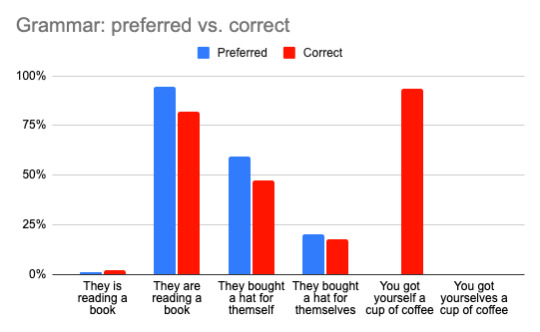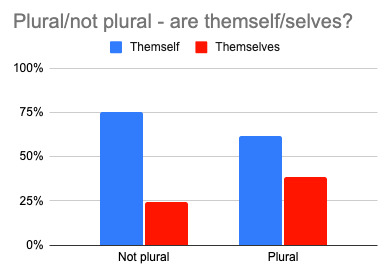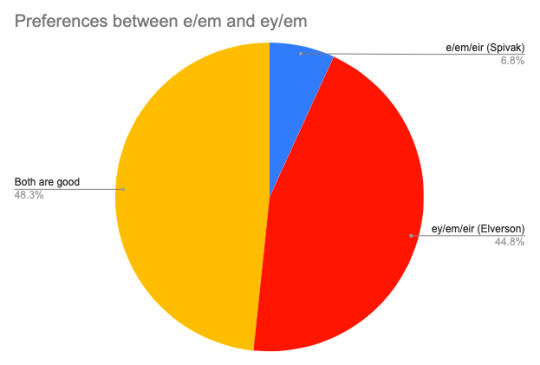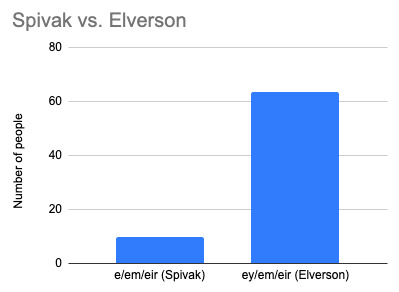#i thought about adding another option making fun of people who make fun of dialects/unfamiliar food
Explore tagged Tumblr posts
Text
#i thought about adding another option making fun of people who make fun of dialects/unfamiliar food#but it's my day off let's not start aggro#i might finish but i won't start#polls#wigan kebab#now that's what you call a butty
18 notes
·
View notes
Text
Supplementary survey: they/them reflexives, The Sir/Ma’am Issue, and Spivak vs. Elverson
This short, clarifying survey ran from 4th until 24th April 2021. There were 2,998 usable responses. Unlike the annual Gender Census survey, this one was open to anyone of any gender, provided they lived in an English-speaking country.
It asked about two things:
They/them verbs and reflexives - basically whether people who prefer they/them pronouns prefer the reflexive to be themself or themselves, and which people feel is more “correct”.
Sir/ma’am/? - investigating why people use sir/ma’am in areas where it’s polite and common to do so, and whether there are any viable nonbinary or gender-neutral alternatives.
This blog post will also investigate the Spivak vs. Elverson issue, which was actually a separate poll that took place on two social networks.
~
THEY/THEM VERBS AND REFLEXIVES
Someone asked about themself vs. themselves, and it reminded me of some of the they/them issues that people ask about in feedback boxes and various confusions surrounding them.
Singular they - what is it, and when and how do people use it?
Plural they - what is it, and when and how do people use it?
What is the “correct” reflexive for each of these?
You can see the statistics in more detail here, but here’s the graph as an overview:

Participants were asked a series of questions about singular they pronouns. Everyone was asked a “which is correct” question, and participants who sometimes or always like to be called ”they” were also asked about their personal preferences.
The graph is a view of only participants who sometimes or always like to be called “they”.
Verbs. As you can see, participants overwhelmingly (94.3%) wanted people to use plural verbs (”they are reading a book”) when talking about them in the third person - even though the percentage of people who thought that was the most “correct” form was a little lower (81.8%). This was lower because 11.4% of participants who preferred “they” answered “both are correct”.
Reflexives. People were much more likely to say that both themself and themselves were correct (28.3%), and more likely to have no preference between the two (17.4%). However, themself was still more popular overall at 59.3%, and 47.3% thought themself was grammatically correct.
You as a control. I also asked all participants whether yourself or yourselves was more correct when addressing one person as a kind of control question, because they is almost grammatically identical to you - it can refer to one person or multiple people, it takes plural verbs even when referring to/addressing one person, and in that situation only the reflexive changes. Many people who say that singular they is grammatically incorrect have no issues with singular you, so it seemed like something that might be interesting to compare. In the graph above you can see that 93.6% of people thought yourself was more correct; only 4.2% of they-accepting participants felt that both yourself and yourselves were equally correct when addressing one person.
There were a couple of things that came up several times in the comments:
“They is” is common in African-American Vernacular English (AAVE), and probably in other dialects too. As I don’t live in the US I’m pretty unfamiliar with this dialect, but either way that seems fine to me. It’s part of why I also asked for participants’ locations, because I wanted others to be able to download the results and see if some regions were more likely to use some words/constructions than others.
There were some alternatives to themself and themselves presented, such as theirself and theirsen. Both of these points lead nicely to the third...
The idea that any language choice is more “correct” than another is quite prescriptive. What feels correct or natural varies depending on a lot of factors, such as where in the world you learned English, and there is no such thing as objective correctness when it comes to such a broad and variable language as English.
I am aware of and agree with that third bullet point, so my asking which phrases were more “correct” was a bit of a trick question. It was a good way to get a feel for people’s linguistic instincts.
I also thought it was interesting that participants who never wanted to be called they were slightly more likely to side with the most popular view on what is “correct” across the board, and less likely to say “both are correct”.
~
PLURAL VS. SINGULAR THEY
I actually ran another version of this survey first and then scrapped the responses, because it was clear that my survey design was leading to some pretty confused and unhelpful data! Among other things, it asked participants whether they preferred singular or plural they for themselves and then directed them to particular questions based on their answer, and the comments suggested that people either didn’t really understand the distinction or meant different things by those terms, even though I had added help text.
This is my understanding:
Singular they is they/them pronouns when used to refer to one person. Verbs are usually plural (i.e. “they are” rather than “they is”), and themself and themselves are both common. Example usage: They are getting themself a cup of coffee. They bought themselves a nice new hat.
Plural they is they/them pronouns when used to refer to two or more people. Verbs are usually plural (i.e. “they are” rather than “they is”), and themselves is almost universal (with the exception of regional variations such as theirselves). Example usage: They are getting themselves some coffee together. They all bought hats for themselves.
Some plural/multiple people refer to themselves as “we” and prefer to be addressed as “they/themselves” (which they call plural they) because they are a group of individuals sharing one body.
The reason I initially asked directly about singular vs. plural they is because I was concerned that plural/multiple systems would cause some statistical confusion. Many plural people have asked me to add plural they to the checkbox list of pronouns in the annual survey, but since it has never been entered by over 1% of participants I have never had reason to do so. As far as I knew, the only difference between singular and plural they is the reflexive (themself for singular and themselves for plural), so I wanted to be able to investigate non-plural people in isolation, and I was curious to know about any trends or differences. I wanted to find out if I should be doing anything differently to ensure that Gender Census statistics are helpful.
So, I swapped out the badly-designed question for a straight-up checkbox, a “check this box if you’re plural/multiple” type of thing, with a note that participants should fill in the survey once per body wherever possible, and then I made some graphs.
Here you can see that plural systems were still more likely to prefer people to use themself to refer to them rather than themselves, though the margin is narrower:

Plural participants were also more likely to say that they sometimes or never want people to refer to them as they, whereas non-plural people were more likely to want people to always refer to them as they (or they just feel fine about it):

There’s not a lot in it, though. It’s all relatively evenly distributed, with no strong leader in either category there.
For the curious: 8.2% of participants checked the plural/multiple box.
In conclusion: plural and non-plural people alike all prefer people to use themself when referring to them in the third person using they/them pronouns, and I feel that there is probably no need to ask about plurality or separate out data from plural people in future. (Asking about this and seeing the responses did in part prompt me to start an anonymous feedback form for plural participants of the Gender Census, though.)
~
THE SIR/MA’AM ISSUE
For several years participants have been asking me in the feedback box of the annual Gender Census survey to also ask about gender-inclusive or nonbinary-specific alternatives to sir and ma’am. I’ve largely not done anything about it, because when informally asking around I’ve generally had the response “just don’t say sir or ma’am, just leave it out altogether.” I live in the UK, where if someone calls you sir/ma’am you’re either looking at home in a fancy restaurant for billionnaires or you’re being made fun of - or sometimes both.
However, during this year’s annual survey while talking about it in a little more depth I learned that there are places in the world where sir/ma’am is very common, required for politeness, and basically inescapable. Nonbinary people in those areas are really struggling, because they do actually need a nonbinary-friendly stand-in for those terms - omitting the sir/ma’am isn’t an option.
Again, the location question was asked so that anyone else downloading the spreadsheet of responses can analyse by region to find out whether sir/ma’am is ubiquitous in particular regions and in which contexts it is used, and can even check whether there is a region-specific alternative to sir/ma’am emerging. I asked several questions about sir/ma’am, including about reasons/contexts and personal preferences, and some superficial analysis is included on the spreadsheet of responses.
But the juicy bit is the nonbinary-specific and gender-inclusive alternative words, right?
[The counting formula is case-sensitive so I made everything lowercase to make the count a little more accurate.]
Suggested gender-inclusive alternatives to sir/ma’am
mx - 4.1% (151)
friend - 2.2%
comrade - 1.2%
captain - 0.7%
ser - 0.5%
mate - 0.4%
m - 0.3%
per - 0.3%
boss - 0.3%
folks - 0.3% (9)
Suggested nonbinary-specific alternatives to sir/ma’am
mx - 8.3% (250)
mix - 0.7%
tiz - 0.5%
friend - 0.4%
ser - 0.4%
comrade - 0.3%
mixter - 0.3%
captain - 0.2%
ind - 0.2%
mir - 0.2% (6)
So it looks like Mx (pronounced “mix” or with a toneless vowel that sounds a bit like “mux”) is the clear winner in both categories. If you want to try to introduce a gender-neutral version of sir/ma’am in your area this one is probably your best bet.
~
SPIVAK VS. ELVERSON
This wasn’t part of the same survey! It was a Twitter poll and a Mastodon poll that ran for one week and ended today, and I’m putting it here because it has to go somewhere.
Sometimes people refer to the ey/em and e/em “versions” of the Spivak pronoun set, which makes my eyebrows do things, because they’re not both Spivak. They are distinct established pronoun sets with their own names.
Spivak - e/em/eir/eirs/emself - written about by Michael Spivak in the 1990s. [source: Nonbinary Wiki]
Elverson - ey/em/eir/eirs/emself - created by Christine M Elverson in the 1970s. [source: Nonbinary Wiki]
The Elverson set is older, but it’s less well-known for some reason, so they’re assumed to be variants of Spivak due to the similarity in spelling.
I was recently asked how we can know which is more popular, given the “oh this checkbox option is close enough, I’ll just choose that instead of typing in my very slightly different set” effect and the “hmm this checkbox option is very close to my set, I’m probably meant to choose this one” effect, plus the boost that checkbox options get with the “oh I hadn’t thought of that one but yeah, why not” effect. Spivak (e/em) is on the checkbox list of pronouns in the annual survey, so it appears to be much more popular than Elverson (ey/em)... but is it really?
I ran a poll on both Twitter and Mastodon, and then used a spreadsheet to extract the useful numbers. There were 141 relevant votes after one week. I wouldn’t usually make annual-survey-altering decisions based on a sample that small, but in this case the results are extremely decisive:

It seems that the highest proportion of people who like at least one of the sets are happy for both to be used, at 48%. 45% prefer ey/em (Elverson) and 7% prefer e/em (Spivak). This is pretty stunning! I’ve been presenting e/em (Spivak) as a checkbox option on the Gender Census annual survey for years, possibly since the first survey in 2013, and because it’s a checkbox option it seems to be consistently a lot more popular than ey/em (Elverson). That’s 4.3% and 0.6% respectively in the 2021 survey. But this poll suggests that actually ey/em (Elverson) is much more popular when the two pronoun sets are viewed on a level playing field.
When you remove all “I don’t mind” votes, you get this:

Over 6 times as many people prefered Elverson!
I will definitely be adding Elverson to the Gender Census next year, just so that we can split the e/em and ey/em votes and really get to the bottom of this.
Anyway, while we’re on the topic, ey/em takes singular verbs most of the time.
298 notes
·
View notes